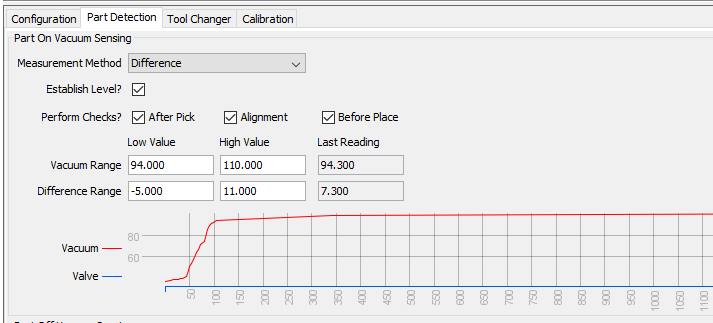Part detection
geo0rpo
mark maker
I don't know what you mean. Please elaborate.
Hello all!!!I have read and reread but cannot understand what the "difference" in part detection method does. Please help me understand.
--
You received this message because you are subscribed to the Google Groups "OpenPnP" group.
To unsubscribe from this group and stop receiving emails from it, send an email to openpnp+u...@googlegroups.com.
To view this discussion on the web visit https://groups.google.com/d/msgid/openpnp/cf67caea-7457-48f6-bc79-b3971ba440b4n%40googlegroups.com.
geo0rpo
mark maker
The Wiki says:
The difference is computed in comparison too a baseline: For
the Part-on this is the established vacuum level, before the
nozzle is lifted up. For Part-off this is the vacuum level
before switching on the valve for a quick probing pulse.
I don't know how to formulate it better. 🙁
Maybe a native English speaker could elaborate.
_Mark
To view this discussion on the web visit https://groups.google.com/d/msgid/openpnp/bc4399a6-f7d1-42b6-9271-e43c2e20266fn%40googlegroups.com.
geo0rpo
You received this message because you are subscribed to a topic in the Google Groups "OpenPnP" group.
To unsubscribe from this topic, visit https://groups.google.com/d/topic/openpnp/vPys0A5Zdmo/unsubscribe.
To unsubscribe from this group and all its topics, send an email to openpnp+u...@googlegroups.com.
To view this discussion on the web visit https://groups.google.com/d/msgid/openpnp/ea7f8b33-d69a-cf7e-9091-ae289dde9ce7%40makr.zone.
mark maker
It first measures the baseline value, as described. Then later,
it measures the comparison value as described. The difference
between the two is now the criteria.
So for instance, while the nozzle tip is still pressed down on the part, it measures the vacuum. Then it lifts the part to Safe Z and again measures the vacuum. The difference between the two measurements then gives you the difference value to compare against your Difference Range. If the vacuum was falling too much then probably the part was not successfully picked.

In fact, you can ignore all these technicalities: There is a
field Last Reading that tells you what the value was, when
you last tested a pick. You can try with a successful pick and the
retry with an unsuccessful pick (perhaps remove the part before,
so it is picking an empty feeder). Then you have two Last
Reading values. And you can set the Difference Range
accordingly, i.e. it should include the successful Last
Reading with some margin, but exclude the unsuccessful
Last Reading with some margin.
_Mark
To view this discussion on the web visit https://groups.google.com/d/msgid/openpnp/CANKvoS0%2BCcc-wMAQb2LNzc1CaZ9H2KLyjpTvR20YVkTuWtfR0w%40mail.gmail.com.
geo0rpo
mark maker
Yes, please read the whole Wiki again, now that you understand
this aspect.
_Mark
To view this discussion on the web visit https://groups.google.com/d/msgid/openpnp/d3679f62-7b29-4aa3-9989-1e16f5b688d3n%40googlegroups.com.
